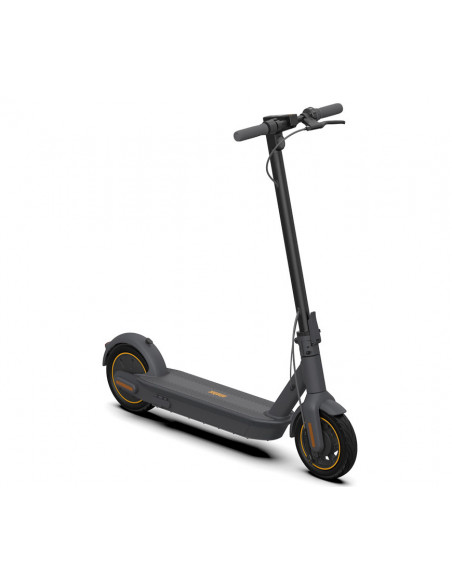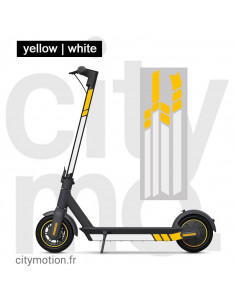Features
- 10 Inch Tubeless Pneumatic Tyre for a smoother ride
- Max. speed up to 25km/h (15.5 mph)
- Range up to approx. 65km (40.4 miles)
- 20% climbing angle
- Electronic brake (rear) and drum brake (front)
- Built-in charger for fast charging
- Resistance rating of IPX5 for the whole body (IPX7 water resistance to its core components)
- Press Bell included
Featuring the longest range of 65 km (40 miles) within its class, robust 10-inch pneumatic tyres, and one-push folding frame, the Ninebot KickScooter MAX G30 is here to spark riders with a more dependable and comfortable riding experience.
- Range
- up to 65 km
- Maximum Speed
- 25 km/h
- Weight
- 18 kg
- Minimal Age
- 12 years
- Battery
- 551 Wh (15,3 Ah)
- Motor Power
- 350 W
- Dimensions folded
- 111 x 47 x 54 cm
- Dimensions unfolded
- 116 x 47 x 120 cm
- Suspensions
- No
- Tires
- Patented Anti-skid Tubeless Tires
- Wheel size
- 25 cm
- Lights
- Front & Rear
- Braking light
- Yes
- Lateral reflectivity
- Yes
- Ring Bell
- Yes
- Water resistance
- IPX4
- Folding mechanism
- Yes
- Maximal charge time
- 6 h
- Max Slope
- 20%
- Maximal driver weight
- 30 - 100 kg
- Regulatories
- Yes, French legislation.
40.30.0000.00
How it started with Segway
One day inventor Dean Kamen saw a young man in a wheelchair struggling to get over a sidewalk. He realized that the problem wasn't an ineffective wheelchair, it was that the world was built for people who could balance. Subsequently, he and his team created the Independence IBOT™ Mobility System, a self-balancing mobility device that enables users to climb stairs and negotiate uneven surfaces. After that, the thought arose that a balance machine had far-reaching possibilities for people with full mobility as well.
Our inspiration for the name Segway came from the word segue, which is defined as "to transition smoothly from one state to another". Segway transforms a person into an empowered pedestrian, allowing him/her to go farther, move more quickly and carry more.
The Self-Balancing Technology
If you stand up and lean forward, you won't fall on your face just like that. Your brain knows you are out of balance, because fluid in your inner ear shifts. It triggers you to put your leg forward and stop a possible fall.
The Segway technology does pretty much the same thing, except that our vehicles have wheels instead of legs, a motor instead of muscles, a collection of microprocessors instead of a brain and a set of sophisticated tilt sensors and gyroscopic sensors instead of an inner-ear balancing system. Like your brain, a Segway product knows when you are leaning forward. To maintain balance, it turns the wheels at just the right speed and you’ll move forward.
Keep it green
As a leader in electric mobility, it's always been Segway-Ninebot's vision to produce environmentally friendly short-distance transportation alternatives. Today, more and more people are using Segway-Ninebot products as an eco-friendly alternative for many of the short journeys that are typically made by car. Besides that, zero-emissions are given off during operation, allowing you to ride your vehicle indoors as well.
The story of Ninebot
Ninebot is a privately held company headquartered in Beijing, China. In 2015 Ninebot strategically merged with Segway, headquartered in Bedford, US. The combined company focuses on the research and development, design, manufacturing, distribution and sales of short-distance transportation products. The combined company has strategic headquarters in the US, The Netherlands and Beijing as well as manufacturing centers in the US and China.
Segway and Ninebot are devoted to seamlessly connect robotic solutions to smart phones and integrate existing technologies and future concepts, such as voice interaction and facial recognition with its robotic products – products that will be highly interactive and encourage smarter living.
No reviews
You might also like

























